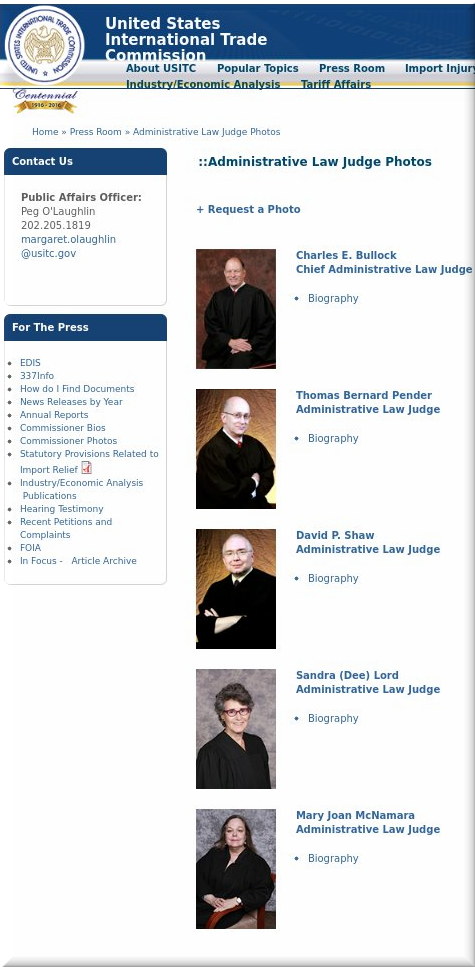

Reference: Administrative Law Judge Photos
Sometimes companies want to bypass the ordinary courts (District Courts, Federal Circuit, SCOTUS) to just quickly issue an injunction, i.e. embargo, raids, prevention of import/sales and so on. It's the kind of thing that the EPO is pursuing with its shameless UPC lobbying. The assumption that any patent granted by the USPTO is OK or should be presumed valid is a dangerous one and proper justice (due process, plus appeal/s, innocence until proof of guilt) isn't assured anymore. It's a leap towards extreme action. It's not really patent justice but patent prejudice and maximalism. It's like copyright takedowns (as per DMCA) where the accused gets censored without even a right/access to defense. Ripe for abuse? By design?
"It's not really patent justice but patent prejudice and maximalism. It's like copyright takedowns (as per DMCA) where the accused gets censored without even a right/access to defense."Arista Networks uses inter partes reviews (IPRs) for the Patent Trial and Appeal Board (PTAB) to scrutinise the patents at hand; Arista Networks won the case/appeal, but the ITC then shockingly enough snubbed the ruling, having never previously ignored such rulings! There was a lot of commotion about this at the time (especially last year) and now we learn, courtesy of World Intellectual Property Review (WIPR), that the ITC will review the administrative law judge’s (ALJ) decision. To quote:
The US International Trade Commission (ITC) said yesterday it will review an administrative law judge’s (ALJ) determination regarding a patent infringement claim Cisco Systems brought against computer networking company Arista Networks.
The ITC said it will review the final remand enforcement initial determination (REID) that the ALJ issued in June, when it found that Arista did not violate a cease and desist order regarding one of the patents.
In January 2015, the ITC launched an investigation into Arista based on a complaint from Cisco.
Cisco alleged that Arista had violated section 337 of the Tariff Act of 1930 by importing certain network devices, related software and components that infringed six patents relating to software.
[...]
The ALJ’s investigation determined again that Arista did not violate the cease and desist order. Both parties filed petitions for review of the REID and filed responses to the other side’s petitions.
"Whose interest would be served by embargoes? Not the public's, that's for sure... Arista's engineers have already been compelled to make their products intentionally worse."Judges must take into account not the interests of law firms that profit from litigation/feuds but technologists who profit from actual innovation. Whose interest would be served by embargoes? Not the public's, that's for sure... Arista's engineers have already been compelled to make their products intentionally worse. This is never a positive thing; in fact, Cisco's legal actions have already put many companies like Arista at existential risk. ⬆